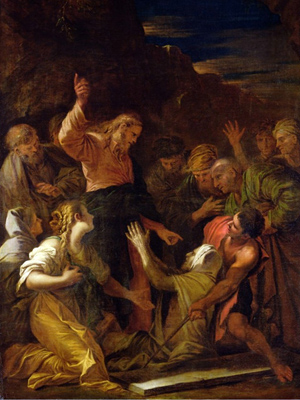Scripture:
Leviticus 13:1-2, 44-46
1 Corinthians 10:31-11:1
Mark 1:40-45
Reflection:
“If you wish, you can make me clean.”
Several times in the Hebrew Bible, God punished people for their disobedience by inflicting them with leprosy. The Israelites naturally assumed that leprosy was the punishment for sin.

Moreover, leprosy had at least three dimensions — medical, religious, and social. The afflicted person suffered medically from a serious skin disease. This disease made them ritually, that is, spiritually unclean and thus forbidden from entering a synagogue or any place of worship. Perhaps leprosy’s worst immediate punishment was social. Lepers were required to live in isolation and to keep a distance of at least 50 paces from other people, so as not to spread the disease. Only the examination by a priest and his pronouncement that the person no longer had leprosy could he or she return to their family and society. Until then, the afflicted person, unable to work, was reduced to begging
This was the dire situation of the leper who approached Jesus. “If you wish,” the leper pleaded, “you can make me clean.” In making his request, the leper violated the distance rule. He came close to Jesus. And Jesus, too, broke a serious rule by reaching out and touching the leper. “I do will it,” Jesus said to the leper. “Be made clean.” And the leprosy left him immediately.
Jesus then warned him, “See that you tell no one anything, but go, show yourself to the priest…” This once leprose man who had disobeyed Mosaic law by approaching Jesus, now disobeyed Jesus by proclaiming how he had been made clean by Jesus.
Ironically, the man once isolated from family and society, now freely entered the town, having been cleansed medically, religiously, and socially. And Jesus, who had touched the leper, now was forced to go into a kind of “leprose” isolation from people.
This, undoubtedly, is what Paul meant when he wrote, “God made him who had no sin to be sin for us so that we might become the righteousness of God” (2 Cor. 6:21). Symbolically, Jesus became a leper so that the cleansed leper might become the righteousness of God.
So too with us, the lepers of today, we rightly approach Jesus in faith and hope, asking for his help, his compassion, and his forgiveness. Jesus’ outstretched hand touches us today, most especially in the sacraments of the Church, as well as in our prayer lives. On the cross, Jesus became sin for us so that we might become the righteousness of God by the way we reach out to the lonely, the ill, the poor, the discouraged who need our touch, the divine touch who is Jesus.
Deacon Manuel Valencia is on the staff at Mater Dolorosa Passionist Retreat Center, Sierra Madre, California.
